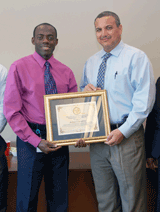Archive for April 3rd, 2013
C4C targets appliances in anti-corruption campaign
(CNS): Despite the question marks raised over the so-called ‘treating’ by their endorsed candidates at a recent rally in George Town, the Coalition for Cayman is launching an anti-corruption campaign to persuade voters not to sell their votes. With years of speculation that politicians have been guilty of supplying voters with refrigerators, microwaves and other electrical appliances in the run up to past elections, the coalition said Wednesday that the country could no longer let politicians continue to grow a culture of corruption. The advertising campaign will consist of television and radio ads titled “Appliances”, in which C4C urges the Caymanian voters not to sell their vote for an appliance or a frozen turkey.
“As an advocate for good government, Coalition for Cayman believes the first step to restoring the public’s trust in our democracy is ending the dishonest practice of vote buying,” said officials from C4C. “The fact is, trading your vote is not only illegal it also allows unethical politicians to grow a culture of corruption in our government. As an advocacy group, our role is to protect the future of Cayman by supporting and promoting Country First leadership, and electing the right leaders begins by electing honest leaders,” the group added.
The Elections Office has said that it will be paying close attention to the continued allegations of corruption during this year’s campaign, which has begun with a ban on entertainment and catering at public meetings in order to prevent the lavish parties and pre-election rallies that have become part of the local campaigns. In addition, the office said it would be watching out for any form of inducement, vote buying or undue influence.
The C4C launched its campaign against the political system rather than the behaviour of specific politicians and blamed parties for the development of corruption. There are many who disagree with that position, including local political experts who have pointed out that during the days of loose affiliations and teams corruption was very much a part of the campaigns as well as the horse trading for Cabinet positions after the result. It was at that point that candidates would wheel and deal to cobble together governments, picking the leaders and ministers after the election.
Given the events of the last four years, many say that corruption in government and local politics is at the hands of individual politicians, and while voters may be frustrated with the political choices before them, they also see corruption and mismanagement in the local government administrative system as well as among the elected officials.
A copy of the “Appliances” television ad can be viewed on the C4C website here.

Candidates must come clean about business
 (CNS): All of the candidates who are contesting the general election next month must come clean and declare all of their financial and business interests, employment and directorships, as well as their major assets and shareholdings in a register at the Legislative Assembly. The Register of Interests is open to the public to scrutinize so that they can see what special or pecuniary interests the people nominated to run in the general election have. All nominees are required by the Register of Interests Law to fill-in, sign and submit the printed Financial Interests Registration Form to the Registrar at the Legislative Assembly Office.
(CNS): All of the candidates who are contesting the general election next month must come clean and declare all of their financial and business interests, employment and directorships, as well as their major assets and shareholdings in a register at the Legislative Assembly. The Register of Interests is open to the public to scrutinize so that they can see what special or pecuniary interests the people nominated to run in the general election have. All nominees are required by the Register of Interests Law to fill-in, sign and submit the printed Financial Interests Registration Form to the Registrar at the Legislative Assembly Office.
For full details about the law and to print copies of the registration form visit the Legislative Assembly website here.
Printed forms can also be collected from the LA office desk between 8:30am to 5pm. Sale of the law in hard copy is available from 9am to 3pm, according to the LA office.
In addition, candidates who have business contracts with government are obligated under the constitution to publish those interests in the government gazette before the day of the general election. The new constitution does not give a specific date, as was the case under the old Cayman Islands constitution, an issue which caught out both Mark Scotland and Dwayne Seymour in the last election. The two candidates both missed the deadline to declare the government business that the two men had at the time of their campaign and were forced to gazette the details of their public contracts late.
Once elected, no official challenge was mounted against the now incumbent cabinet ministers in the minority government. However, after the election a group of local voters challenged the two candidates in the Grand Court under an originating summons, which was thrown out by the chief justice as he found it was not the appropriate way to challenge an election result.

Health department issues stomach flu advisory
 (CNS): Following the recent gastroenteritis outbreak in Turks and Caicos, Cayman’s Public Health Department (PHD) has issued advice about what to look out for and how to take precautions against becoming infected. No instances of the condition are reported locally and officials in Cayman say they are monitoring the situation. In it’s advisory the health department says that Gastroenteritis, commonly referred to as “stomach flu”, is an inflammation of the gastrointestinal tract, which includes the stomach and intestines. It can be caused by several different types of viruses, including Noroviruses, rotaviruses and adenoviruses, as well as different bacteria, such as Salmonella, Campylobacter, Cryptosporidiosis.
(CNS): Following the recent gastroenteritis outbreak in Turks and Caicos, Cayman’s Public Health Department (PHD) has issued advice about what to look out for and how to take precautions against becoming infected. No instances of the condition are reported locally and officials in Cayman say they are monitoring the situation. In it’s advisory the health department says that Gastroenteritis, commonly referred to as “stomach flu”, is an inflammation of the gastrointestinal tract, which includes the stomach and intestines. It can be caused by several different types of viruses, including Noroviruses, rotaviruses and adenoviruses, as well as different bacteria, such as Salmonella, Campylobacter, Cryptosporidiosis.
Common symptoms of Gastroenteritis are nausea and vomiting, watery diarrhea, fever and chills, abdominal pain and blood in the stool. Gastroenteritis can spread through the air or by coming in to close contact with someone who is infected. Viral gastroenteritis is usually a short illness lasting usually 1-2 days. Bacterial gastroenteritis can last for much longer, depending on the organism responsible for the illness. Because the incubation period for viral gastroenteritis is usually between 24 and 48 hours, anyone with the infection is advised to stay away from school or work until any diarrhea or vomiting has stopped. The incubation period for bacterial gastroenteritis can vary from a few hours to several days.
Gastroenteritis often goes away without treatment and symptoms can last from a day to several weeks. Those infected are advised to get plenty of rest, drink lots of liquids, and avoid eating fruit and all dairy products except yogurt.
Simple hygiene measures can minimize the risk of spreading the infection. These include washing hands thoroughly, being careful when handling anything that has been in contact with an infected person and avoiding the preparation of food until after the symptoms have gone.
See attachment for the full advisory.

Government employee of the month named
 (CNS): Selburn Christian, Senior Statistician of the Economic and Statistics Office (ESO), was named last month’s Cayman Islands Government’s Employee of the Month for January 2013. Mr. Christian, who heads ESO’s System of National Accounts (SNA) unit, scored a perfect grade of “excellent” in all the selection criteria. Mr. Christian was recognised for his leadership of the SNA unit, staff training and playing a role in capacity building and succession planning. Deputy governor, FranzManderson, said of Mr. Chistian, “His exceptional proficiency, high calibre of work, and above all, his exemplary professionalism have earned him this recognition.”
(CNS): Selburn Christian, Senior Statistician of the Economic and Statistics Office (ESO), was named last month’s Cayman Islands Government’s Employee of the Month for January 2013. Mr. Christian, who heads ESO’s System of National Accounts (SNA) unit, scored a perfect grade of “excellent” in all the selection criteria. Mr. Christian was recognised for his leadership of the SNA unit, staff training and playing a role in capacity building and succession planning. Deputy governor, FranzManderson, said of Mr. Chistian, “His exceptional proficiency, high calibre of work, and above all, his exemplary professionalism have earned him this recognition.”
Commenting on his award, Mr. Christian said, “I am elated, appreciative and humbled to have received this award. It is always a good feeling to be recognised for your contributions as it augments the motivation and drive to keep fighting. I always try to give of my best as that is who I am, so to be acknowledged for being “Most Professionally Excellent" is indeed an honour for me.” He continued, “As a national accounts statistician, the job can get overwhelming at times, so it rewarding to know that you are appreciated and celebrated for what you do and how you do it. As we say in Jamaica, encouragement sweetens labour.”
Deputy financial secretary, Mrs. Sonia McLaughlin, who selected Mr. Christian for the award, said , “Mr. Christian’s achievements and efforts are worthy of emulation”
ESO Director Maria Zingapan says, “He consistently, diligently and robustly carries out the ESO’s mission, which is to support evidence-based decision making by providing accurate, timely and user-friendly information that is relevant to local needs and compliant with international standards.”

CHEC port deal leaked
 (CNS): The incumbent members for North Side and East End were the recipients of yet another critical but secret document that was leaked this weekend. Arden McLean (EE) and Ezzard Miller (NS) received a copy of the CHEC Framework Agreement relating to the cruise port, which was signed by former premier McKeeva Bush and Port Authority Chair John Henry in March 2012. Miller, who gave the document to CNS, said the shocking revelations amount to, at the very least, misfeasance in public office on the part of those involved, as none of them were in a position to sign away the huge sums of tax-payers' money, as revealed in the document, without Cabinet approval.
(CNS): The incumbent members for North Side and East End were the recipients of yet another critical but secret document that was leaked this weekend. Arden McLean (EE) and Ezzard Miller (NS) received a copy of the CHEC Framework Agreement relating to the cruise port, which was signed by former premier McKeeva Bush and Port Authority Chair John Henry in March 2012. Miller, who gave the document to CNS, said the shocking revelations amount to, at the very least, misfeasance in public office on the part of those involved, as none of them were in a position to sign away the huge sums of tax-payers' money, as revealed in the document, without Cabinet approval.
The confidential deal, which is posted below, contains a number of clauses which show that claims made by the previous government, and in particular Ellio Solomon, the lead negotiator with CHEC, about the cruise port deal were incorrect and cast a considerable shadow of doubt over the promises the UDP administration made about the deal.
However, even more worrying is a clause that the Cayman government appears to be liable to CHEC for as much as US$3.5 million now that the deal has been terminated to cover the Beijing-based firm’s expenses. This means that the next cash strapped administration could be faced with a whopping legal bill that the public purse will have to meet.
The deal shows that promises of a full Caymanian workforce on the project were undermined by a clause permitting CHEC as many as 300 work permits as part of the agreement. Another clause calling for the Chinese firm to use the service of local firms and to purchase from local merchants was also weakened by a list of so many exceptions that the developer had no obligation to use local businesses at all.
The deal also gave CHEC up to $10 per passenger from the taxes that would be collected from the cruise passengers, as well as the tender fee that would have been paid to local operators. It also guaranteed the firm passenger arrivals that would have committed the CIG to make up the difference if those arrivals were not met by the cruise lines.
Although the lease was set for 49 years, there was a clause for renewal that could have given the Chinese firm ownership of Cayman’s port for over 80 years.
Shocked by the details in the document, which is understood to have been kept secret not only from the UDP caucus and the rest of the port board but also from the members of Cabinet, Miller told CNS that in this case Cayman had to be grateful to the UK authorities for stepping in and stopping the deal.
“Nothing that the UDP administration claimed about this deal appears to have been the case; in fact, it is the opposite,” he said. “How it was possible for the chairman of the port board to commit to a guarantee of some $16 million in fees per year to CHEC without the approval of Cabinet or the port board has to be misfeasance in public office by all those involved.”
He pointed to the fact that Bush signed the document, which Miller described as a complete sell out of the Caymanian people, in his position as premier and not as tourism minister, even though the deal is between CHEC, the Port Authority and the Ministry of Tourism. This, he believed, was to offer comfort to the Chinese firm that it was being signed by the country’s ultimate authority.
“Yet he and the port chair did not have the authority to do this without Cabinet approval,” Miller added. “We understand from the current Cabinet members that none of them were privy to this framework agreement, undermining claims by the premier and others that consultation had been taking place over the negotiations, which were being led by Solomon,” he said.
Miller pointed to what was now clearly misplaced praise from some supporters, as the North Side MLA said that anyone who read the deal would see how bad it would have been for the country had it not been stopped.
“It begs the question of the competence of the UDP member who is seeking re-election. We have to be grateful for the UK’s intervention,” the North Side representative said, adding that the British government had stopped the deal without even seeing the framework agreement.
“On 22 May, the people of Cayman need to think hard about the competence and the motivations of those involved in this when they go to the polls and ensure that the UDP can never be in a position to put Cayman at such great risk again,” Miller added.
See the CHEC framework agreement below.

HSA prescription refills now available online
 (CNS): The Cayman Islands Health Services Authority (HSA) has announced that its patients can now order refills of existing prescriptions online. Refills ordered online are available on valid prescriptions and can be ready for collection within 24 hours. Patients requiring a new prescription, or those whose prescriptions no longer entitle them to refills, must make an appointment to see a doctor. Lizzette Yearwood, the HSA’s Chief Executive Officer, says, “This service allows patients to simply go online to order a repeat prescription, meaning patients can order their medication from the ease and comfort of their own home. This cuts down on the time and energy wasted in physically going to the hospital’s pharmacy to order a refill,” she confirms.
(CNS): The Cayman Islands Health Services Authority (HSA) has announced that its patients can now order refills of existing prescriptions online. Refills ordered online are available on valid prescriptions and can be ready for collection within 24 hours. Patients requiring a new prescription, or those whose prescriptions no longer entitle them to refills, must make an appointment to see a doctor. Lizzette Yearwood, the HSA’s Chief Executive Officer, says, “This service allows patients to simply go online to order a repeat prescription, meaning patients can order their medication from the ease and comfort of their own home. This cuts down on the time and energy wasted in physically going to the hospital’s pharmacy to order a refill,” she confirms.
“We are continuously working to improve our service and anticipate that patients will enjoy considerable benefits from these latest efforts. At the HSA we are fully committed to bettering the patient experience," she adds.
Chief Pharmacist, Mr. Colin Medford said, “We have been testing this service with some of our patients and the feedback has been very positive.”
Orders can be placed online at www.hsa.ky, by clicking on the ‘Pharmacy – Refill Request Form’ link and filling out the prescription information form.

Caribbean Auditor Generals discuss accountability
 (CNS): Public sector auditors from the Caribbean region met in Port of Spain, Trinidad and Tobago between 18th and 21st March, for discussions on the theme of “collaboration to promote best audit practices.” This was the ninth congress of the Caribbean Organisation of Supreme Audit Institutions (CAROSAI) as well as the 25th anniversary of the organisation that was formed to promote greater accountability by governments throughout the Caribbean. Attending the congress from the Cayman Islands was Auditor General, Mr. Alastair Swarbrick. “I am looking forward to working with my colleagues in CAROSAI to discuss the recommendations from the congress with our parliamentarians in the coming months,” he said upon returning from the Congress at which he was elected as a member of the Executive Committee.
(CNS): Public sector auditors from the Caribbean region met in Port of Spain, Trinidad and Tobago between 18th and 21st March, for discussions on the theme of “collaboration to promote best audit practices.” This was the ninth congress of the Caribbean Organisation of Supreme Audit Institutions (CAROSAI) as well as the 25th anniversary of the organisation that was formed to promote greater accountability by governments throughout the Caribbean. Attending the congress from the Cayman Islands was Auditor General, Mr. Alastair Swarbrick. “I am looking forward to working with my colleagues in CAROSAI to discuss the recommendations from the congress with our parliamentarians in the coming months,” he said upon returning from the Congress at which he was elected as a member of the Executive Committee.
The auditors heard from a number of speakers who focused on the challenges facing the Supreme Audit Institutions including the implementation of the United Nations resolution requiring independent national public sector audit institutions and implementation of new international auditing standards. With most countries facing difficult economic conditions, severe austerity measures and charges of inefficient government operations, the auditors are implementing a plan to help their governments achieve greater efficiencies and reduce wasteful expenditures. Each auditor is attempting to ensure their work plans are addressing these challenges.
Mrs. Sharman Ottley, Auditor General of Trinidad and Tobago, said, “As the incoming chair, I am pleased to see the high level of collaboration between the audit offices of CAROSAI.” She added, “We are now better positioned to do more effective audits in our own audit offices.”
Attending the four day conference were the heads of the national audit offices of the Caribbean region, Mr. Terrence Nombembe, the Auditor General of South Africa, who is also President of the International Organization of Supreme Audit Institutions (INTOSAI), Dr. Josef Moser, the Secretary-General of INTOSAI and President of the Austrian Court of Audit, and representatives of various stakeholders and donor organizations who support CAROSAI with funding and expertise. Those organizations included the Inter-American Development Bank, INTOSAI Development Initiative (IDI), CCAF-FCVI, ACCA-UK and World Bank.
The auditors are exploring opportunities to undertake a cooperative audit of revenue collection throughout the region and report the results to their respective governments. The audits will report on how well their governments are assessing and collecting taxes, duties and fees. Led by Mr. Leigh Trotman, Auditor General of Barbados, work on this initiative will begin in the coming months. Mrs. Lyn Provost, the Auditor General of New Zealand also shared her experience as Secretary-General of the Pacific Association of Supreme Audit Institutions about how their group of public sector auditors is dealing with similar challenges with their organization.
CAROSAI was formedin 1988 to promote greater public sector accountability in the Caribbean region. With 22 member nations, the heads of the Supreme Audit Institutions meet every three years to approve their strategic plan, collaborate on best practices and training opportunities, and elect the executive committee.